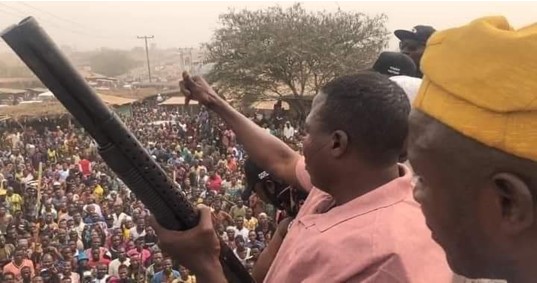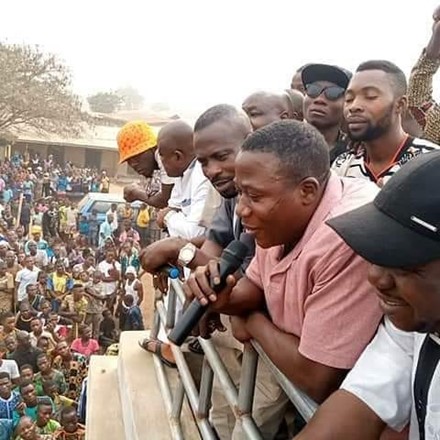
On Saturday, Jan. 16, a controversial personality and self-acclaimed Yoruba rights agitator, Sunday Igboho, stormed the home of Seriki Fulani in Oyo State, Southwest Nigeria, Saliu Abdulkadir, to issue a seven-day quit notice to him and members of his community.
During the visit, Igboho alleged that Fulani elements in the town were behind the rising cases of insecurity in Ibarapa zone of Oyo State.
On Friday, Jan. 22, Igboho was given a hero’s welcome at Igangan town with drums and gongs by residents in the afternoon as he began to inspect whether any member of the Fulani community was still around.
Scared, Fulanis in the town, including the Seriki, fled for their lives before the arrival of battle-ready Igboho. But this did not spare some of their properties as about 11 vehicles and an uncertain number of houses were set ablaze by Igboho’s boys.
Background
The Ibarapa zone of Oyo State like some other communities in Southwest Nigeria has in recent times recorded rising cases of insecurity. In Ibarapaland, many residents allege that the masterminds of the cases are members of the Fulani community.
This allegation has, however, been disputed on multiple occasions by the Seriki, who claims the criminal elements among the Fulani, who work with people from other ethnic groups, including Yoruba elements, are the nomads who do not settle in a single community.

But Igboho and other residents have continuously insisted that the Fulani are “killing our people (Yorubas).”
Farmers in the zone like in other states in Southwest, have also reported numerous cases of brutality in the hands of Fulani herdsmen who practise open grazing of their flock in farmlands.
Justified?
The question about whether Igboho’s actions are justified has become a subject of controversy as he and his ‘army of boys’ march on.
Some observers in the state are of the opinion that Igboho in ,his recent outbursts and actions show hat that there was a breakdown of the security system in the state by the Chief Security Officer, Governor Seyi Makinde.
The argument of this set of people is backed by the governor’s display and body language. Makinde initially kept mum while multiple cases of killings and kidnappings continued to cripple Ibarapaland. After Igboho threatened to eject the Fulani community, the governor waited for four days before speaking on the issue.
When he spoke, Makinde vowed to order the arrest of anyone stoking ethnic violence in the state. While he did not explicitly mention Igboho in the broadcast, it was obvious he was the target of the message.
However, the governor has failed to order the arrest of Igboho who has since chased away Fulanis from Igangan town. To the surprise of some observers, Igboho on Friday openly dared the governor to arrest him.
“Is it the herdsmen that make the laws of the land? Have you forgotten when you were ‘bankrolling’ me when you wanted to become governor and all I did for you all during the elections and now you dare threaten me?
“Well, I don’t believe that you are serious with your threats yet; until you bring all the soldiers and policemen to arrest me in my house before I know you are serious,” Igboho said.
After Igboho issued the quit notice, the foremost Yoruba sociocultural group, Afenifere, distanced itself from his actions.
The group described Igboho as a private citizen who had no power to expel other citizens.
But the overwhelming show of support Igboho has received so far – online and offline – indicates that the people are not concerned about whether he has the legal authority to act the way he has done.
“Sunday Igboho is a messiah; he is our helper,” Yekeen Oladimeji, an activist and resident of Ibarapaland, told HumAngle on Saturday morning.
He said residents of the town invited Igboho to help secure Ibarapaland and chase away the Fulani when it became evident that the Makinde-led state government had shown no interest or had the political clout to ensure safety of lives and property in the zone..
Oladimeji listed various cases of kidnapping and killings in the area in the last one year and said such a situation created an impression that the state government had lost control of security in the zone.
He said that political office holders from the zone had kept quiet and done nothing tangible to identify with the grievances of the people over the situation.
Oladimeji said that what broke the people’s trust in the government was when the governor in his broadcast referred to insecurity in Oke-Ogun, a different zone in the state, without mentioning Ibarapa.
The message this sent to residents was that the governor was either not interested in the insecurity in the seven local government areas in Ibarapa zone or he deliberately tried to underscore it.
On the question of whether Igboho had the legal authority to embark on his actions, Oladimeji like others defending him, argued that where the state failed in its duties, the people had no choice but to find alternatives.
“I know he does not have the right unless the government authorised him but anyone that has lost his relative or made huge ransom payment to kidnappers will not stop this man. We are pained by what we have been suffering, that was why we called on him.
“When our government has failed us, we can’t see anyone who projects himself as a messiah to us and decide to send that person away. If the man had refused to come yesterday (Friday), we are in for it,” Oladimeji stressed.
He noted that at the moment, no political office holder in the area would be able to receive the support of residents like Igboho because they failed to act at the right time.
“We have 100 per cent confidence in Sunday Igboho,” Oladimeji said.
Similarly, a lawyer and political commentator, Muhideen Olagunju, lauded the steps taken by Igboho.
He said “any form of condemnation from any section of the Yoruba nation is tantamount to gifting the balance of convenience in the intractable matter of Fulani excesses to the Fulanis.”
Olagunju, who is a former lawmaker in the state, said that the government appeared to be unwilling to prevent or punish anyone for crime.
“There is always a threshold for tolerance. That threshold has been broken in Ibarapa. Sunday Igboho took action, perhaps crudely so, but Ibarapa got the attention it craved from authorities.
“He is right to feel aggrieved. He is right to go to Ibarapa. He is right to confront the criminals.
“Thankfully, he is wise enough not to cross his boundaries. He did not maim or kill anyone but he was loud and clear about the resolve not to take the excesses anymore,” Olagunju wrote.
He called on the governor to take things up from where Igboho stopped.
“It is trite that society retains institutionalised structures to address every issue through the instrumentality of government. However, the willingness of the government to use its instrumentality well is never guaranteed in a society like Nigeria.
“Therefore, where the government fails, it will be hard to criticise citizens who took the initiatives, particularly if it concerns lives.
“The security of lives and properties in Oyo State lies squarely on the big shoulders of the governor. The time to act decisively is now,” he added.
An Ibadan-based legal practitioner, Kehinde Adegbite, told HumAngle that strictly by the law, Igboho’s action ran afoul of the constitution since he was not a state actor.
However, Adegbite noted that on the basis of necessity, the action of the self-acclaimed activist was justified because the government had failed to arrest the menace of Fulani herdsmen.
“If we are following the law those who have been accused of perpetrating these criminalities should have been arrested and investigated. We are not saying people should be dealt with without being tried. They should go through due process. But is the police ready? Is the government ready?
“If we are talking about the law, we may say Sunday Igboho is not acting within the confines of the law. That is the law. But has the law protected the people? Has the law made them more secure? So, I can’t blame him. Maybe that will also prompt the government to step up and do what they are obligated to do under the law.
To prevent the escalation of the crisis, Adegbite said the government must be sincere in its actions by ensuring that residents’ lives and properties were protected.
“Security agencies should be allowed to do their jobs professionally. All these ethnic bias and favouritism should stop. We don’t need Sunday Igboho as long as the government is up to the task,” Adegbite said.
Support Our Journalism
There are millions of ordinary people affected by conflict in Africa whose stories are missing in the mainstream media. HumAngle is determined to tell those challenging and under-reported stories, hoping that the people impacted by these conflicts will find the safety and security they deserve.
To ensure that we continue to provide public service coverage, we have a small favour to ask you. We want you to be part of our journalistic endeavour by contributing a token to us.
Your donation will further promote a robust, free, and independent media.
Donate HereStay Closer To The Stories That Matter





